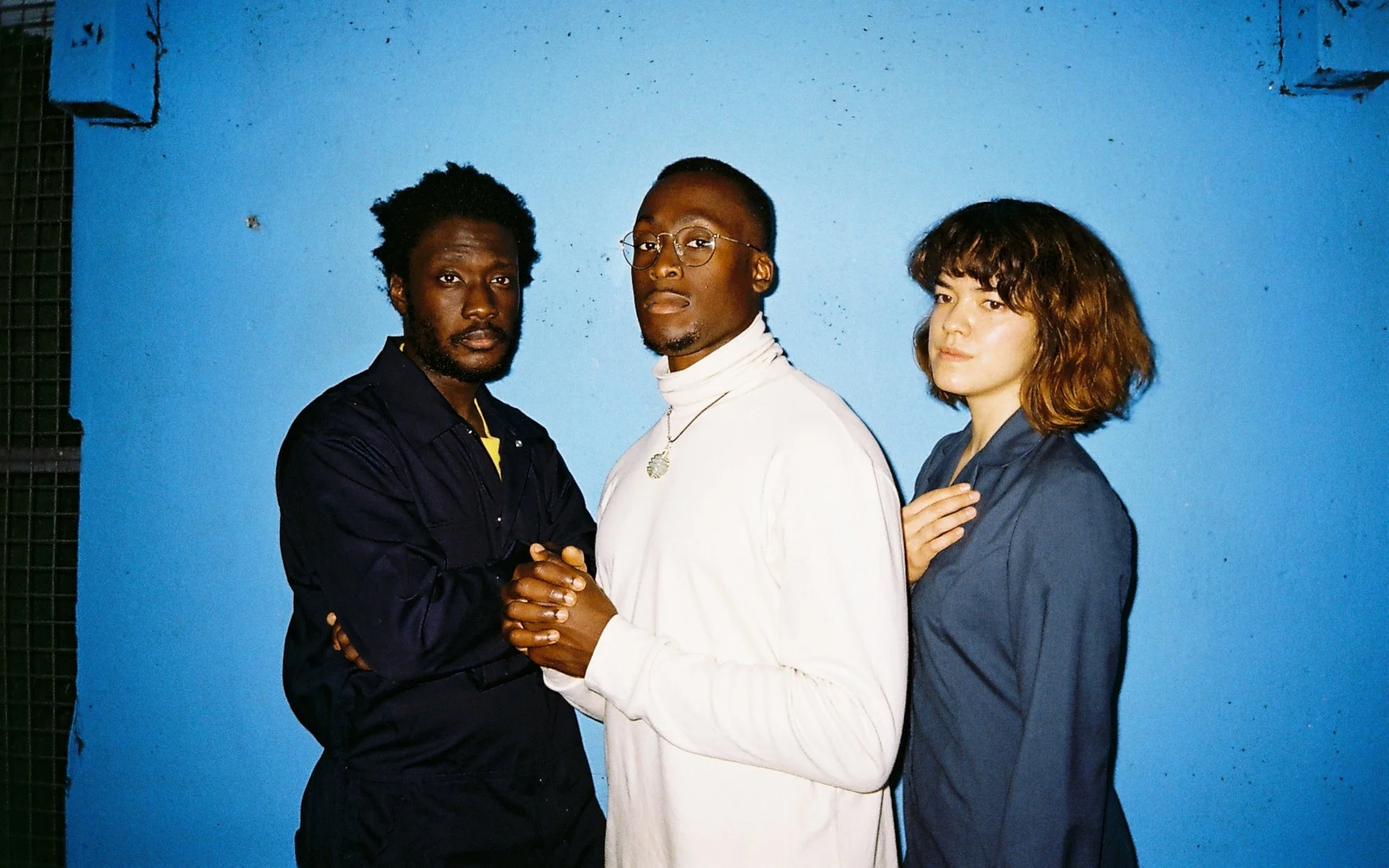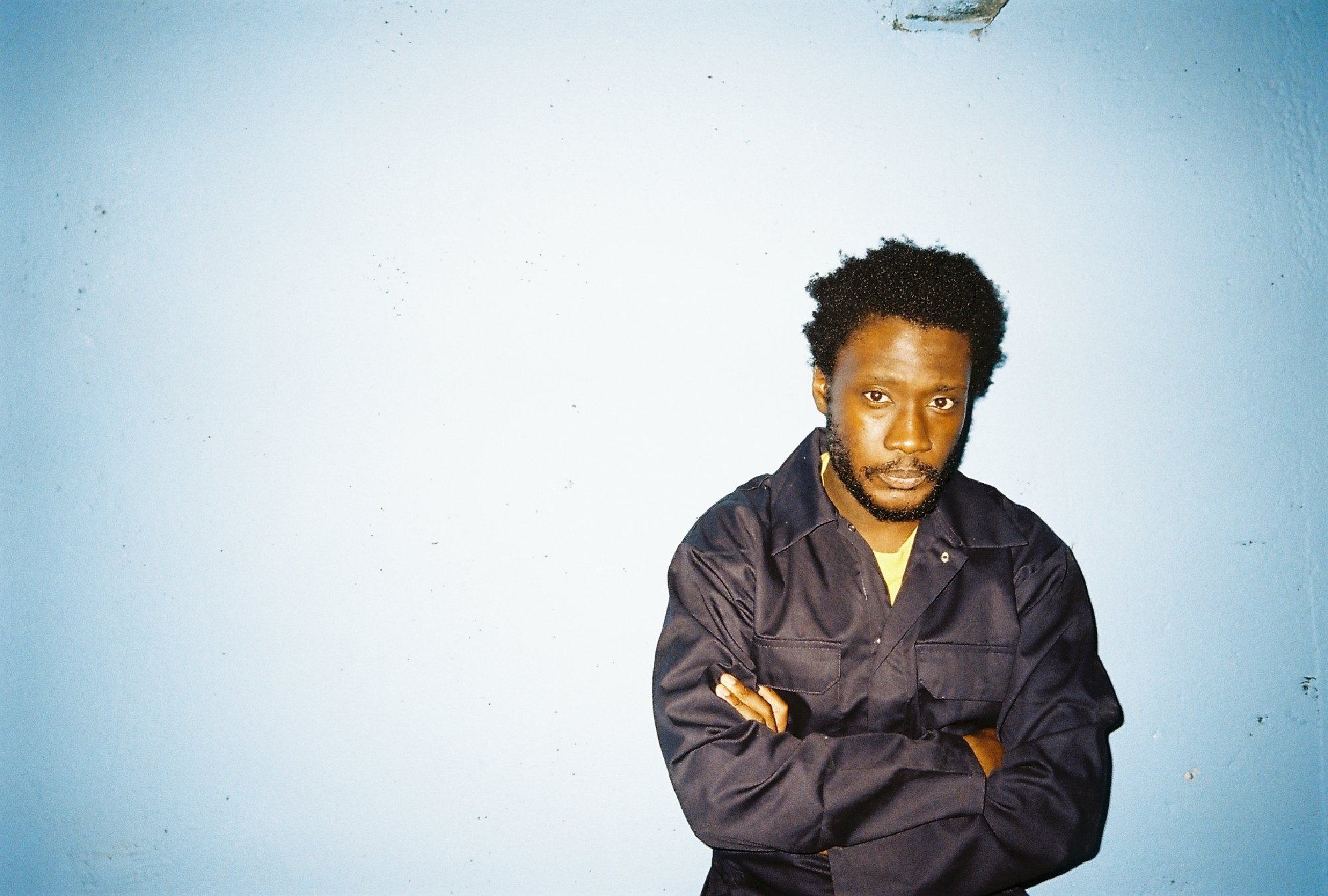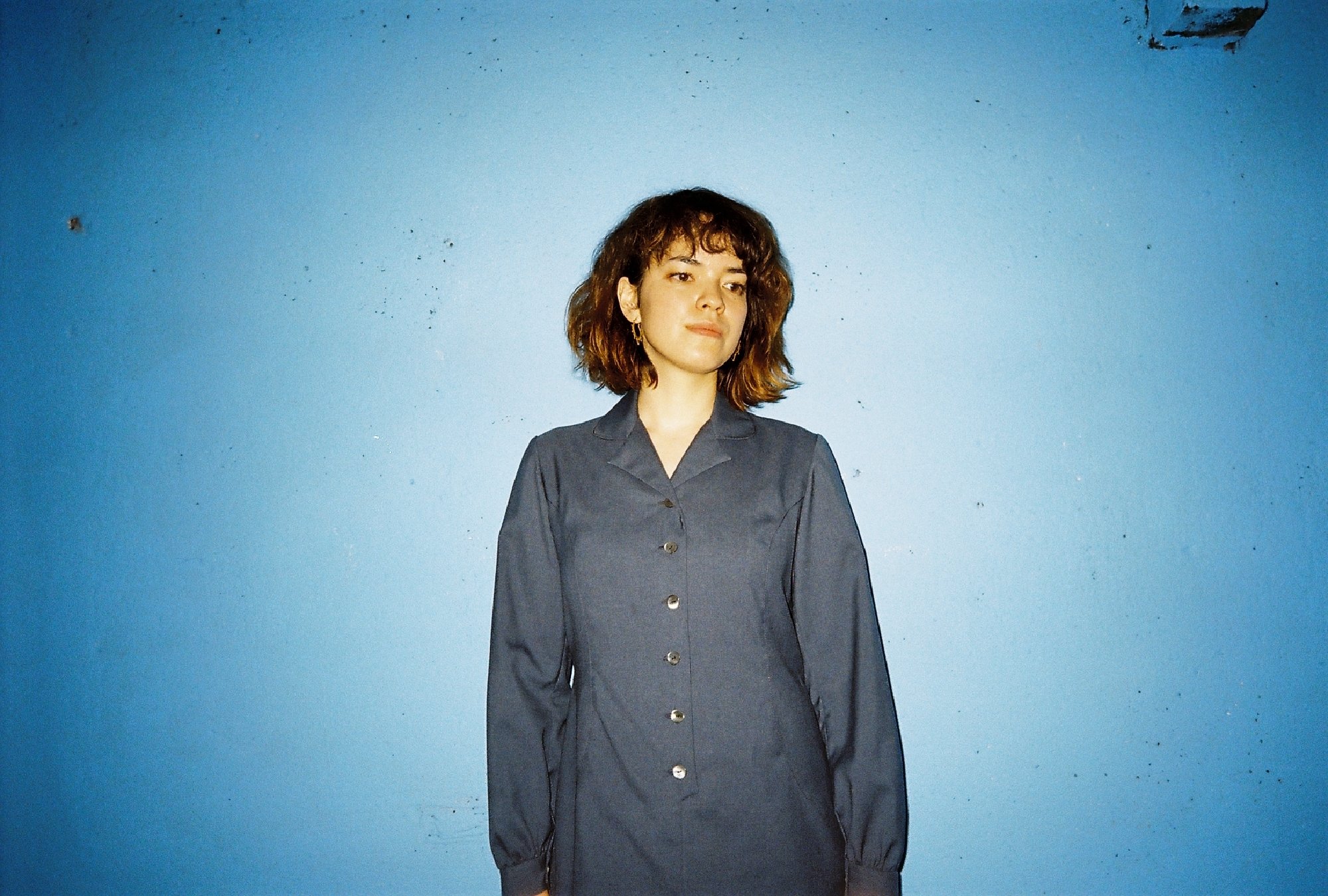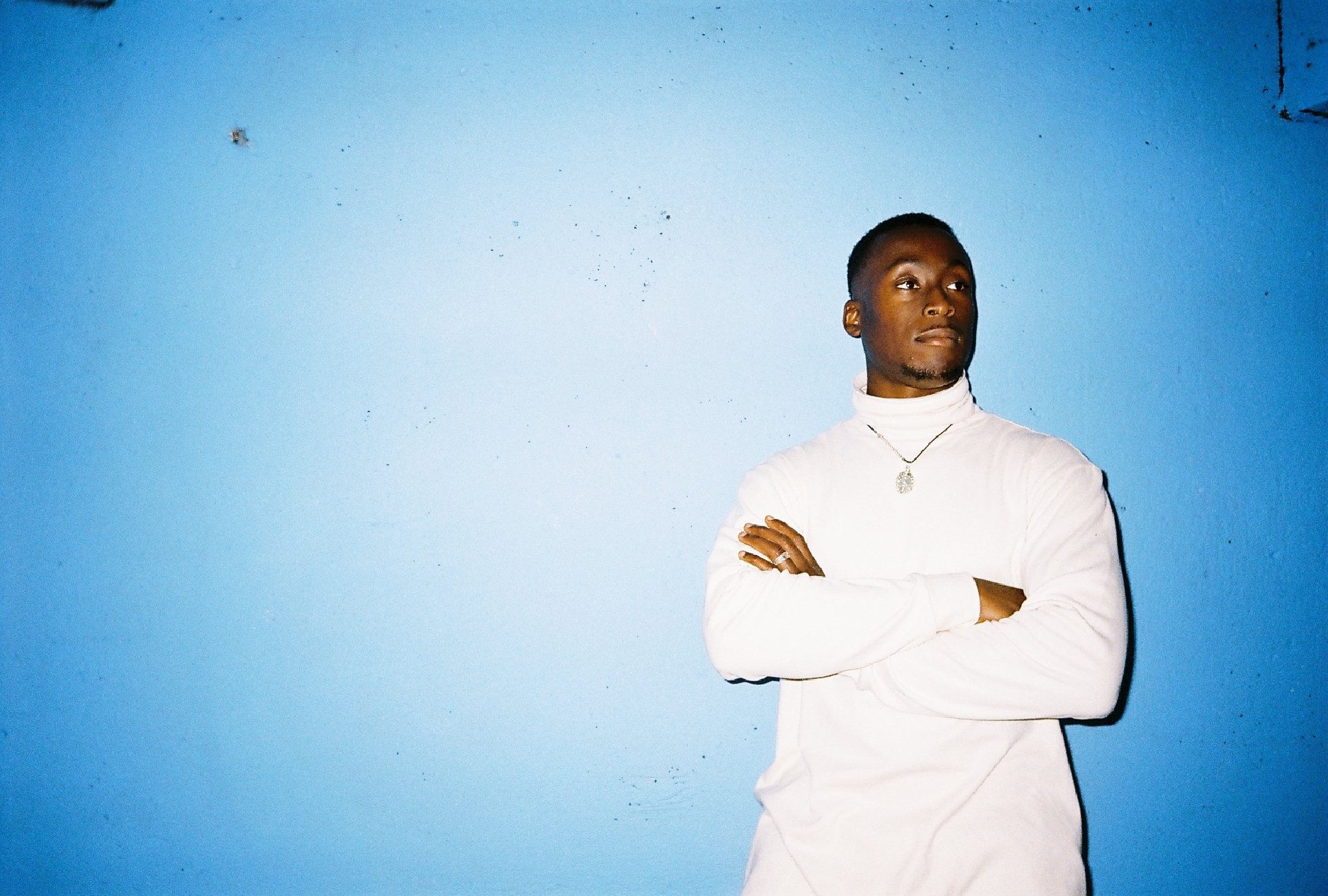This multi-hyphenate artist's debut album invites listeners to find emotional release
Nadeem Din-Gabisi is a multidisciplinary artist threading messages of collective and individual resilience through poetry, film, painting and most recently, music. His experimental stories of redemption are where Black people are seen as universal figures rather than caricatures created by popular culture. For example, his short film ‘MASS’ follows a protagonist on their rite of passage to discovering the home within. Yet out of all of the mediums he explores, Din-Gabisi suggests that sound is the most effective due to the potency of its delivery. Music allows a clear line of communication to an audience through which improvisation can then lead the way. “It's because of that dialogue and the fact that when you make a record, you can transform it constantly,” he says. “I can’t really do that with a painting.”
The British-Sierra Leonean, London-based artist has recently released his debut album ‘Pool’. It explores the idea of drowning in the midst of grief, clashing identities and colonial displacement. In this instance, a pool can be symbolic of our physical bodies made up of 70 percent water or the cities we find ourselves submerged in. Across 12 riveting tracks, he assesses his relationship with those themes, discovering ways in which one can arrive at a state of equilibrium. The song ‘Deep End’ follows Din-Gabisi as he traces remnants of his past self over cascading percussion. Here, he revisits the murder of his cousin and grapples with the illusion of safety, realising that he must fortify himself and be his own saving grace before assuming that role for others. “There are a lot of heavy subject matters on the album but it’s also got a lot of lightness to it, a lot of joy in spite of the heaviness.”
He tells me this emotional rollercoaster is echoed by the production, an influence from a particular style embedded within Sierra Leonean music where robust rhythms jolt listeners into graceful movements despite the sadness of the lyrics. It’s a dynamic that Din-Gabisi explores alongside musicians Momoko Gill, Coby Sey and Beni Giles to form an engrossing foundation for his graphic storytelling.
The artist describes the song ‘Splash’ as a nod to classic hip hop tracks such as ‘Memory Lane’ by Nas, Kanye West’s ‘Family Business’ and Scarface’s ‘My Block’. Both the throbbing bass of ‘Poolside View’ and the broken flows of ‘Pour’ are influenced by old school grime with electronic embellishments. ‘Holy Wata’ veers into Pentecostal territory as Din-Gabisi reflects on his relationship with Christianity over flavourful guitar twangs and organ accompaniment. And closing track ‘Exit’ relies more on everyday experiences. “The chorus is something that is chanted as a reference to football culture and Englishness,” he says.
All this leaves us grateful for the brief interludes offering breaks from the collision of sounds. Suitably titled ‘Towel’ and ‘Shore’, these tracks guide the listener into a safety net made up of a grand piano melody. “When it gets really intense, there are moments where you then feel relaxed. It was always about moving to a place where you can breathe. Transitioning from tension to peace, from erratic-ness to stillness - those are the main ideas throughout.”
The album’s creative process brought to Din-Gabisi’s attention the importance of acknowledging the joy and struggles of the collective rather than just the individual. He warps the first-person language to encompass his experiences and that of others who may relate to him. “When I say, ‘I’ve got holy wata hit’ - it’s not just me, it’s a whole continent of people that have been disrupted by the colonising effects of Christianity and Islam. It mentions individual matters but it’s an experience that is not just mine.” This idea is sonically imitated by the vocal ensemble that appears across the project, initiating a call and response to his reflections.
Joni Mitchell’s ‘Blue’, Marvin Gaye’s ‘What’s Going On’, Tupac’s ‘Me Against the World’ and Buju Banton’s ‘Still Shining’ are four albums he cites as great examples of speaking on the individual while addressing the collective. Further inspiration for his artistry comes from the literature of Amiri Baraka and Jayne Cortez because of their ability to incorporate personal philosophies to create relatable work. Similarly, Patti Smith’s memoir ‘Just Kids’ reminded him that people’s real-life stories are just as powerful as poetic works.
A recent discovery he made is that his uncle was a well-known producer of the 60s and 70s, creating hits like ‘Let Me Love You’ by Bunny Mack. His family played an integral role in fostering his creative spirit, from frequent library visits with his mother to the old school tapes his father would hand down to him, introducing new jack swing, reggae and R&B to a young and eager Din-Gabisi. He went on to study fine art, attaining his MA from Chelsea School of Art, while establishing himself as a spoken word artist at south London’s Steam Down alongside fellow house poets Belinda Zhawi and And.Is.Phi. Early releases include ‘Wear’ featuring MTMBO and ‘After The Dance’ and then in 2020 he met producer and engineer, Charlie and Benny, who aided in solidifying Din-Gabisi’s vision for the album.
Equally formative was his year-long residency at Somerset House where he shaped ‘Pool’ into a multimedia project, expanding the scope of his conversation around finding inner peace. And earlier this year Din-Gabisi was the recipient of the Nicholas Daley x Fred Perry grant created for unsigned musicians. This allowed him access to the prestigious Metropolis Studios to re-work the album track ‘Exit’ into the punk-injected ‘Second Exit’. “Some people suffer from doubt and question their paths. So, opportunities like this are helpful not just financially but also as an affirmation that you can actually do this,” he asserts.
“When the album gets really intense, there are moments where you then feel relaxed. It's about moving to a place where you can breathe”
Another affirmation came through a chance encounter with Zambian-born artist Sampa The Great at a Steam Down jam session back in 2018. He performed, she was suitably impressed, and he went on to feature on her track ‘Energy’, for which Din-Gabisi adopts the perspective of an all-knowing narrator, celebrating the valour and beauty of female energy. His approach to the track is another nod to the Creole music his grandma would play around him growing up. “Sierra Leonean culture is very aware of mortality and of the time we have on the planet,” he says, acknowledging the culture’s emphasis on honouring the life we are given. “For the chorus, Sampa had the idea of getting into a deeper dancehall energy with the ‘big up your energy’ a reference to artists like Buju Banton and other dancehall DJs. I really enjoyed doing that and it just felt very natural once it came together.” The song spoke to Barak Obama enough to make it onto his 2022 Summer Playlist.
As the contents of the album settles into our subconscious, allowing new streams of thoughts to bloom, ‘Pour’ is the first track to receive a visual treatment with direction from Sylvia Suli. In the video, Nadeem is found lying in the arms of a woman who is adorned in a beautiful yellow gown. He settles into a posture of surrender, unravelling the pent-up emotions of a young man ready to let go of toxic masculinity. “It’s an ode to the powers of vulnerability internally as well as externally,” he reflects. “Shaking the yoke of hardness and understanding that softness as well as compassion and comfort are needed, too. ‘Pour’ positions the pen and the voice as tools to provide emotional catharsis, as necessary momentary release and permanent realisation.”
‘Pool’ by Nadeem Din-Gabisi is out now. Discover it here.




